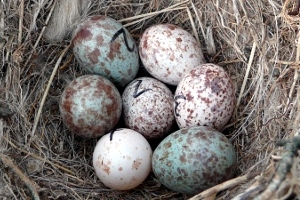Avian brood parasites reduce the reproductive success of their hosts, selecting for antiparasitic defenses in host populations such as foreign egg or chick discrimination. In turn, host’s defences may favor improved adaptations in the parasite, and so on, leading to a coevolutionary process between parasites and hosts. Our research focuses on studying adaptations and counteradaptations in brood parasites and their hosts using as model study species two South American heterospecific brood parasites, the Shiny Cowbird (Molothrus bonariensis) and the Screaming Cowbird (Molothrus rufoaxillaris). In particular, we are now working on the following topics:
(1) nest searching behaviors and spatial patterns of parasitism in cowbird; (2) egg-laying strategies of cowbird females and host-parasite interactions at the time of parasitism; (3) patterns and function of egg-puncturing behavior by cowbird females; (4) properties of parasites’ eggs that confer resistance to puncturing; (5) egg discrimination abilities and constraints on egg rejection in cowbird hosts; (6) adaptations of cowbird nestlings to manipulate host’s parental behaviors; (7) visual and vocal mimicry of host young in Screaming Cowbirds.
We are also interested in the mating systems of Shiny and Screaming Cowbirds, and the process through which the juveniles of these species disperse from their natal territories and join conspecifics.
Researchers and students involved in this area: J. C. Reboreda, V. D. Fiorini, Ma. C. de Mársico, R. Scardamaglia, C. Ursino, I. Crudele, J. M. Rojas Ripari, J. Lois Milevicich, MR. Jacoby, MN. Sabio, C. López Lorences, A. Mendez and C. Miravalles Stasta.
 Shiny Cowbird
Shiny Cowbird
The Shiny Cowbird (Molothrus bonariensis) is a generalist brood parasite whose eggs have been found in nests of more than 200 hosts. Neither their eggs nor chicks mimic those of any particular hosts, but they exhibit a variety of traits that enhance their success in a wide range of host species. Shiny cowbird females also show adaptations that facilitate parasitism and increase the survival of the parasitic offspring.
Mockingbird nest with 4 parasitic eggs (V. Fiorini)



